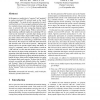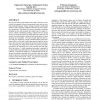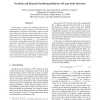129
Voted
IWQOS
2004
Springer
15 years 8 months ago
2004
Springer
In this paper, we consider how to “construct” and “maintain” an overlay structured P2P network based on the “smallworld paradigm”. Two main attractive properties of a ...
110
Voted
HSNMC
2004
Springer
15 years 8 months ago
2004
Springer
Decentralized and unstructured peer-to-peer (P2P) networks such as Gnutella are attractive for large-scale information retrieval and search systems due to scalability, fault-tolera...
121
Voted
HIPC
2004
Springer
15 years 8 months ago
2004
Springer
In this paper, we report a decentralized algorithm, termed ImmuneSearch, for searching p2p networks. ImmuneSearch avoids query message flooding; instead it uses an immune-systems-...
118
click to vote
DBISP2P
2004
Springer
15 years 8 months ago
2004
Springer
Peer-to-Peer infrastructures are emerging as one of the important data management infrastructures in the World Wide Web. So far, however, most work has focused on simple P2P networ...
124
Voted
SIGMETRICS
2004
ACM
15 years 8 months ago
2004
ACM
Traditional Peer-to-Peer (P2P) networks do not provide service differentiation and incentive for users. Consequently, users can easily access information without contributing any ...
120
Voted
SIGIR
2004
ACM
15 years 8 months ago
2004
ACM
Optimizing and focusing search and results ranking in P2P networks becomes more and more important with the increasing size of these networks. Even though a few approaches have al...
132
Voted
ATAL
2005
Springer
15 years 8 months ago
2005
Springer
Peer-to-peer (P2P) systems enable users to share resources in a networked environment without worrying about issues such as scalability and load balancing. Unlike exchange of good...
126
Voted
WWW
2005
ACM
15 years 8 months ago
2005
ACM
An important issue arising from P2P applications is how to accurately and efficiently retrieve the required Web services from large-scale repositories. This paper resolves this is...
130
click to vote
ICNP
2005
IEEE
15 years 8 months ago
2005
IEEE
In this paper, we analyze the problem of network disconnection in the context of large-scale P2P networks and understand how both static and dynamic patterns of node failure affec...
115
click to vote
DEXAW
2005
IEEE
15 years 8 months ago
2005
IEEE
Enforcing DRM in collaborative, Peer-to-Peer (P2P) networks comprising different types of user devices is a challenging task as it is difficult to monitor the network operations i...



